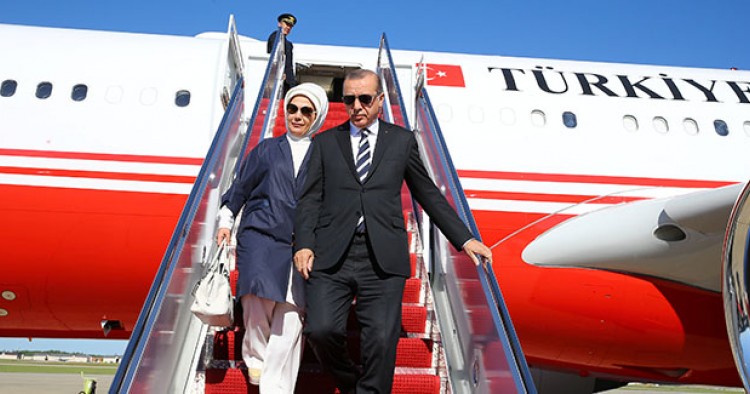President Recep Tayyip Erdogan will meet President Donald Trump as a frustrated and disappointed man. His hopes for a clean slate after strained relations with President Barack Obama have been dashed as Trump has endorsed his predecessor’s policies against key Turkish demands. Importantly, Trump last week approved an Obama era plan to arm Syrian Kurds in preparation for the upcoming battle to retake Raqqa from ISIS.
U.S. cooperation with the Y.P.G., the main Syrian Kurdish militia that Turkey considers a terrorist organization linked to the P.K.K., became a major bone of contention between Washington and Ankara when the previous U.S. administration decided to drop weapons and ammunition to Kurdish forces defending the northern Syrian town of Kobani against ISIS in 2014. Ankara was hoping that it would find a more sympathetic ear on the Syrian Kurds in Trump’s White House, but Trump’s decision deals an even bigger blow to bilateral ties. The extradition of Fethullah Gulen, another key demand of Ankara after Turkey accused the Pennsylvania-based cleric of orchestrating the failed coup last summer, could have made it easier for Ankara to swallow the bitter Y.P.G. pill. But Trump is poised to disappoint his Turkish counterpart on that as well.
Erdogan is also likely to raise the pending trial of Reza Zarrab, a Turkish-Iranian gold trader who has been jailed in New York on charges of violating U.S. sanctions on Iran, with Trump. In 2013, Zarrab was detained by Turkish authorities, only to be released shortly after, in a wide-ranging corruption investigation of businessmen with close ties to Erdogan. The Turkish president has taken a personal interest in his release, but the prospects of Erdogan securing his release are slim.
Returning home empty-handed at a time when his legitimacy has been weakened, and his popularity is shrinking would provoke a strong response from Erdogan, who often scores points at home with his defiant tone against the West. But this time, his options are limited. Turkey has threatened to step up military action against the Syrian Kurds, but that would be too risky given the presence of U.S. forces patrolling the Turkish-Syrian border. If they are accidentally hit by Turkish strikes, Turkey-U.S. relations will suffer another major blow, especially after Erdogan advisor’s remarks threatening to hit U.S. troops.
Turkish officials have made a veiled threat to ground U.S. warplanes at Incirlik airbase, but shutting down the base would cost Turkey one of the few levers it has over Washington, and the Turks know it. Slowing counterterrorism cooperation, as hinted by some Turkish officials, is not viable either since it would hurt Turkey at a time when it is fighting a two-front war against the P.K.K. and ISIS.
Instead, Turkey could step up its military attacks against P.K.K. targets in the northern Iraqi city of Sinjar in an effort to prevent the P.K.K. from gaining further ground there. Ankara is worried that, with Iran’s help, the P.K.K. will turn Sinjar into a logistical base with access into northern Syria.
Erdogan could also pull the “Russia card.” Ankara is engaged in negotiations to procure the Russian-made S-400 air defense system. Last month, the Turkish defense minister announced that the talks about the purchase have reached a "final stage." At a time when tensions between NATO and Russia are high, Turkey’s decision is seen as a snub to the alliance.
Turkey is an important country in the fight against ISIS. To prevent the Turkey-U.S. alliance from sliding into the abyss, Trump has to offer Erdogan something. He might not accommodate Turkey’s demands on the Y.P.G., Fethullah Gulen or Reza Zarrab, but there are things that he can do to mitigate some of Ankara’s concerns.
To reassure Turkey that the United States is still committed to its NATO ally’s security, Washington should double down on support for Turkey’s fight against the P.K.K. It could offer further intelligence assistance, and pressure its European allies to curb funding channels to the P.K.K. Given Turkey’s concerns over the P.K.K. presence in Sinjar, the United States could use its leverage over the Syrian Kurds, the Kurdistan Regional Government, and Baghdad to remove the P.K.K. from Sinjar.
Offering Patriot missile systems at a price acceptable to Turkey, and agreeing to share technology would not only please Ankara, but also help keep Turkey within the Western alliance’s defense arrangement.
After years of dragging his feet in confronting ISIS, the close cooperation between the United States and the Syrian Kurds, and the subsequent stalemate in Turkey-U.S. relations might be Erdogan’s own making. But Washington cannot afford to lose an ally like Turkey, no matter how bewildering the actions of that ally.
Trump’s decision to arm the Syrian Kurds is likely to haunt Turkey-U.S. relations for years to come. It will also feed deep-rooted perceptions within Turkish society that the West wants to carve out a Kurdish state. Regardless of how creative Trump is with his damage-control moves when he meets Erdogan, a great deal of anti-Americanism within Turkey is likely to remain. But efforts to reassure Ankara might keep Erdogan onboard until a lasting solution to the current crisis is found.
The Middle East Institute (MEI) is an independent, non-partisan, non-for-profit, educational organization. It does not engage in advocacy and its scholars’ opinions are their own. MEI welcomes financial donations, but retains sole editorial control over its work and its publications reflect only the authors’ views. For a listing of MEI donors, please click here.













